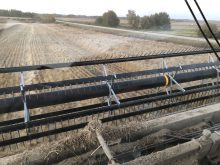I have many memories, when I was a kid, of trips to the elevator.
We’d roll up the driveway and earthen ramp, into the building and over the pit. The man on duty that day — and back then it was always a man — would greet my father as we stepped off the scale.
He’d get a true reading of the full weight of the truck, minus its human cargo, and then it was time to engage the PTO, raise the truck box, and begin emptying the load.
Read Also

Pragmatism prevails for farmers in Canada-China trade talks
Canada’s trade concessions from China is a good news story for Canadian farmers, even if the U.S. Trump administration may not like it.
As that wheat, barley or canola flowed into the pit, the operator would take scoops from the flow, making a composite sample of the load.
Then it was on into the elevator to grade it. I recall being fascinated by the skills on display as they weighed, sieved and counted, rolled out the canola and quickly came to a conclusion.
I don’t actually recall any disputes over that process, though I’m sure they did occur. It would be hard to imagine any years-long commercial relationship where everyone was satisfied every time.
But what was important, back then, was that the farmer selling that grain (or perhaps a family member or trusted hired hand) was almost always present.
But that was back in the day when thousands of delivery points dotted the Prairies, with competing outlets in every small town and village.
These days there are, of course, just a few hundred delivery points covering the same geographic area, and it’s increasingly rare for producers to themselves be behind the wheel of that truck. More often than not, it’s going to be a contract trucker with no skin in the game past wanting to load and unload efficiently and get on to the next job.
That’s why one of the current rules governing grading disputes has increasingly been preventing farmers from being able to protect their own best interests.
As Allan Dawson reports in our Dec. 23 issue, if a farmer currently wants to dispute a grade, they need to do it in person at the time of delivery.
The concern is that this requirement prevents disputes from being lodged and prevents farmers from seeking impartial and binding grading from the federal authority.
So the Canadian Grain Commission is proposing to change this, allowing farmers up to seven days after getting their delivery receipt to dispute the grade.
It would seem that it’s not going to be a huge logistical issue, since the elevator companies are already retaining delivery samples as part of the delivery declaration process.
If anything, it’s surprising that it took this long for any action to be taken on this regulation.
You and other stakeholders have until February 28 to make your views known during the consultation period.
There will be some nuances to work out, of course, but the commission’s proposed changes are a good start on a needed adjustment.
A wild ride
And so ends 2021 for the staff of the Manitoba Co-operator, and the citizens of Manitoba.
We’ll be taking our traditional holiday hiatus next week, and will return to your mailbox with the Jan. 6 edition.
It’s definitely been a year of highs and lows. It began with the announcement of the first COVID vaccines, and the hope that life would soon return to normal.
It then evolved into a year of crippling drought for much of the province, with a ‘drought within a drought’ during the summer months blasting the crops with heat.
The fall saw the return of some hope with rains, albeit too late for this year’s crop, that began the painstaking process of rebuilding the soil moisture.
And now, as the year wears on towards the end, we’re faced with the spectre of a new COVID variant, one that could evade the vaccines.
That picture isn’t hopeless, as early signs suggest ‘Omicron’ as it’s known, may be more virulent but result in less serious illnesses, and that the vaccinated seem to only get mild illnesses.
But it does underscore the unpredictable nature of life on this blue and green ball we call Earth, and the necessity that one be able to bend with the winds, rather than be blown over by the gale.
As we continue down this path we’re on, self-care is going to be more important than ever, especially during the busy and often stressful holiday season.
That can mean reaching out to friends and family, or speaking to a mental health professional through Manitoba’s farm and rural stress line, where you’ll always find a sympathetic and understanding ear.
After all, we’ve all made it this far together, and while it may not always seem like it, things are beginning to get better.
Merry Christmas from all of us, here at the Manitoba Co-operator and best wishes for the coming — and hopefully brighter — new year.


















